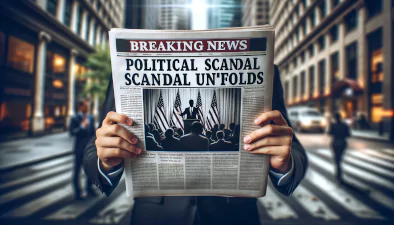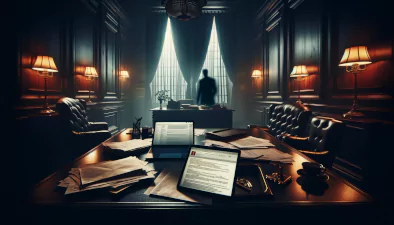In the intricate mosaic of American politics, scandals repeatedly emerged as defining moments, shaping not only the careers of individuals but also the trajectory of political discourse. These scandals, varying in nature from financial misdemeanors to moral transgressions, have consistently played a pivotal role in the public’s perception of governance and the accountability of those in power.
Key Takeaways:
- Historical Significance: Scandals have consistently influenced American political narratives, reflecting the struggle between ethical governance and power temptations.
- Media’s Dual Role: The media serves as both a catalyst and amplifier of scandals, shaping public perception and holding power to account.
- Political Strategy: Scandals are sometimes leveraged for political gain, affecting reputations and distracting from substantive issues, raising ethical considerations.
What Is A Scandal?
A scandal involves actions or behaviors, typically of public figures or organizations, that are perceived as morally or legally wrong and cause public outrage or controversy. It often involves a breach of trust, ethics, or societal norms, leading to widespread public attention and sometimes legal consequences. Scandals can encompass a wide range of activities, including corruption, sex scandals, financial misconduct, and abuses of power, significantly impacting the reputations and careers of those involved.
This article delves into the complex dynamics of political scandals in the United States, exploring their historical evolution, underlying mechanics, the multifaceted role of the media, their strategic use in the political arena, and the potential future trends in an increasingly digital and interconnected world. In doing so, it aims to unravel the enduring legacy of scandal in American politics, a legacy that reflects the perennial struggle between ethical governance and the temptations of power.
Political System Scandals

Table of Contents
- The Intriguing World of Politics and Scandals
- History of Scandal in American Politics
- Sexual Scandals in Politics
- John F Kennedy and Marilyn Monroe
- The Anatomy of a Scandal
- Media's Role in Scandals
- Scandal as a Political Strategy
- Future of Scandal in U.S. Politics
- Conclusion: The Enduring Legacy of Scandal in Politics
- Final Thought
The Intriguing World of Politics and Scandals
In the complex tapestry of U.S. politics, scandals have long played a pivotal role, often shaping the course of history and public opinion. This section explores the phenomenon of political scandals, shedding light on their nature, significance, and the reasons they continue to emerge in the American political landscape.
Subjects of Some Political Scandals
Political scandals can cover a wide range of subjects, often involving allegations of illegal, unethical, or inappropriate behavior by public officials. Here are some common subjects around which political scandals frequently revolve:
- Corruption and Bribery: Involves public officials using their position for personal gain, such as accepting bribes in exchange for favorable decisions, embezzling public funds, or engaging in corrupt practices.
- Abuse of Power: This includes situations where officials use their authority or influence for personal benefit or to harm others, often violating laws or ethical standards.
- Election Interference: Scandals related to manipulating election outcomes, such as voter suppression, gerrymandering, or foreign interference in elections.
- Sexual Misconduct: Involves allegations of inappropriate sexual behavior by politicians, including harassment, assault, or extramarital affairs, especially when they involve abuse of power or public resources.
- Campaign Finance Violations: Scandals arising from illegal or unethical handling of campaign funds, such as unauthorized use of funds, accepting illegal contributions, or failing to disclose financial information.
- Conflict of Interest: Occurs when a politician’s interests conflict with their public duties, leading to decisions that benefit themselves, their family, or their associates at the expense of the public.
- Espionage and Treason: Involve accusations of a politician working against their own country’s interests, potentially aiding a foreign power.
- Cover-ups and Obstruction of Justice: Scandals where officials are accused of concealing wrongdoing (either their own or someone else’s) or interfering with investigations.
- Nepotism and Cronyism: Appointing friends, family, or close associates to positions of authority or advantage, often without regard to their qualifications.
- Misuse of Classified Information: Involves improperly handling or disclosing classified or sensitive government information.
- Policy Scandals: Sometimes, a policy itself, particularly if it leads to significant harm or is implemented in a way that violates legal or ethical standards, can become a scandal.
- Financial Misconduct: Includes embezzlement, misappropriation of funds, tax evasion, and other forms of financial impropriety.
Each of these types of scandals can significantly impact public trust in government and political institutions, often leading to legal consequences, policy changes, and shifts in public opinion.
Scandals come in various forms, each distinguished by their nature and context. Political scandals often involve allegations of illegal, unethical, or questionable conduct by government officials.
Financial scandals are typically centered around fraud, insider trading, or manipulation within financial markets. Corporate scandals usually involve violations of ethical standards or laws by companies or their representatives.
Personal scandals, often found in celebrity or public figure circles, usually involve personal misconduct or moral failings.
Lastly, technological scandals can emerge from misuse or abuse of technology, often impacting privacy, security, or ethics. Each type of scandal has unique implications and consequences, shaping public perception and trust in the respective fields.
The Magnetism of Scandal
Scandals captivate the public for several reasons. They often involve breaking societal norms, betraying public trust, or revealing a dissonance between a public persona and private conduct. The revelation of such discrepancies can be both shocking and enthralling to the public.
Scandal’s Role in the Political Narrative
Scandals play a multifaceted role in U.S. politics. They serve as a check and balance, exposing wrongdoing and holding public officials accountable. However, they can also be used as tools for political maneuvering, where allegations (both true and false) are leveraged to damage reputations or distract from other issues.
The Paradox of Public Reaction
Public reactions to political scandals are often complex and paradoxical. On one hand, scandals can lead to public disillusionment and cynicism towards politics. On the other, they can galvanize public interest in governance and civic engagement, as they highlight the importance of integrity and accountability in public office.
Setting the Stage
This introduction sets the stage for a deeper exploration into the intricate world of political scandals. As we delve into the historical context, the anatomy of scandals, and their impact on the political landscape, we will uncover the enduring legacy and evolving nature of scandals in American politics.
History of Scandal in American Politics
Famous Scandals in History
The history of American politics is rich with scandals, each shaping the nation’s political narrative in unique ways. This section provides a chronological overview of some of the most significant scandals in U.S. political history, tracing their impact on public opinion and political outcomes.
Early Examples of Political Scandals
- The Hamilton-Reynolds Affair (1797): One of the earliest scandals, involving Alexander Hamilton, the first Secretary of the Treasury. The affair was a personal scandal that became public, involving blackmail and accusations of financial misconduct, showcasing the impact of personal indiscretions on public careers.
- Teapot Dome Scandal (1920s): A classic example of government corruption where the Harding administration was implicated in bribery and corruption for leasing Navy petroleum reserves at Teapot Dome and other locations in exchange for personal gifts and loans.
Mid-Twentieth Century Scandals
- The McCarthy Era (1950s): Senator Joseph McCarthy’s anti-Communist crusade led to a period of fear and widespread accusations without proper evidence, resulting in a political scandal that highlighted the dangers of political exploitation of fear and paranoia.
- Watergate Scandal (1972-1974): Perhaps the most infamous political scandal in American history. The Nixon administration’s attempt to bug the Democratic Party’s headquarters led to a political crisis and the eventual resignation of President Richard Nixon, illustrating the impact of political espionage and cover-ups.
Political Scandals in the 1980s
Iran-Contra Affair (1980s): This scandal involved senior administration officials in the Reagan administration secretly facilitating the sale of arms to Iran, which was then embroiled in the Iran-Iraq war, and using the proceeds to fund Contra rebels in Nicaragua, in violation of U.S. law.
Sexual Scandals in Politics
The Clinton-Lewinsky Scandal (the 1990s):
A scandal that brought to light President Bill Clinton’s affair with Monica Lewinsky and led to the second impeachment in U.S. history, emphasizing the intersection of personal morality and public office.
Anthony Weiner Sexting:
The former U.S. Congressman was involved in multiple sexting scandals, leading to his resignation in 2011. Further incidents surfaced in 2013 and 2016, severely impacting his political career and personal life.
Donald Trump and Stormy Daniels
Donald Trump and Stormy Daniels, an adult film actress whose real name is Stephanie Clifford. The scandal centers on an alleged sexual encounter between Trump and Daniels in 2006, a year after Trump married his third wife, Melania Trump.
Key points of the scandal include:
- Hush Money Payment: The core of the scandal is a $130,000 payment made to Daniels in October 2016, just before the presidential election. This payment was intended to prevent Daniels from publicly discussing her claims of the affair with Trump.
- Michael Cohen’s Role: Trump’s lawyer, Michael Cohen, admitted to making the payment to Daniels out of his own pocket. Cohen initially claimed that Trump was not aware of the payment, but later changed his story, stating that Trump had reimbursed him for the payment. Cohen’s involvement led to legal troubles for him, including charges related to campaign finance violations, for which he was sentenced to prison.
- Legal and Political Ramifications: The payment raised questions about potential campaign finance law violations, as it was made in the context of the 2016 presidential election and could be considered an unreported campaign expenditure. The scandal was part of broader investigations into Trump’s campaign and presidency.
- Trump’s Denials: Trump has denied the affair with Stormy Daniels and any wrongdoing related to the payment. His legal team and spokespeople have also denied allegations on his behalf, framing the payment as a private transaction unrelated to the campaign.
- Public Impact: The scandal garnered significant media attention, contributing to the numerous controversies surrounding Trump’s presidency. It raised discussions about personal morality, the legal implications of hush money payments, and the influence of such issues on political careers.
- Legal Proceedings: Stormy Daniels filed a lawsuit seeking to invalidate the nondisclosure agreement she had signed, arguing it was void because Trump had not signed it himself. The case was eventually dismissed, and a court ordered Daniels to pay Trump’s legal fees in a related defamation suit.
John F Kennedy and Marilyn Monroe
The rumored affair between President John F. Kennedy (JFK) and Marilyn Monroe is one of the most famous and speculated-upon aspects of American political and cultural history. While much of the relationship remains shrouded in mystery and speculation, here are the key points often discussed:
- Alleged Affair: Rumors suggest that JFK and Marilyn Monroe may have had a brief affair in the early 1960s. However, concrete evidence of the affair has been elusive, and much of the information comes from second-hand sources, making the true nature of their relationship difficult to ascertain.
- Public Appearances: One of the most public connections between JFK and Monroe occurred on May 19, 1962, when Monroe famously sang “Happy Birthday, Mr. President” at a birthday celebration for Kennedy at Madison Square Garden. Monroe’s sultry rendition of the song, performed in a tight, sparkling dress, fueled speculation about the nature of their relationship.
- Speculation and Consequences: The rumored affair has been the subject of extensive media coverage, biographies, and documentaries. Despite the fascination, both JFK and Monroe were known to have had other extramarital relationships, and their alleged liaison is often seen within the context of their broader personal lives.
- Monroe’s Death: Monroe’s untimely death on August 5, 1962, at the age of 36, added to the mystique surrounding her relationship with JFK. Her death, ruled a probable suicide due to an overdose of barbiturates, has been the subject of numerous conspiracy theories, some of which involve the Kennedy family, though these theories lack substantive proof.
- Historical Context: The rumored affair and the subsequent speculation must be understood within the broader context of the early 1960s, a time when the private lives of public figures were not as scrutinized by the media as they are today. Both JFK and Monroe remain iconic figures, and their alleged relationship is a subject of enduring public fascination.
- Privacy and Speculation: It’s important to note that much of what is believed about the relationship between JFK and Monroe comes from speculative sources. Both individuals were highly public figures, and their deaths have only increased public interest and speculation about their lives.
In sum, the rumored affair between JFK and Marilyn Monroe remains one of the most talked-about aspects of their legacies. It reflects the intersection of politics, celebrity culture, and media in the American consciousness, with a lasting impact that transcends the alleged events themselves.
Political Scandals in the 2000s
- The Iraq War and WMDs (2000s): The controversy over the alleged existence of weapons of mass destruction in Iraq, and the subsequent invasion, raised questions about the manipulation of intelligence and accountability in the Bush administration.
- 2016 Election Interference and Aftermath: Allegations of foreign interference in the 2016 presidential election and the subsequent investigations highlighted the complexities of cyber warfare, disinformation, and political rivalry in the digital age.
Reflecting on the Past, Understanding the Present
Each of these scandals, in its own way, has contributed to shaping the political landscape of the United States. They reflect evolving societal norms, the ever-changing nature of media, and the constant tension between power, public trust, and ethical governance. By examining these events, we gain a deeper understanding of how scandals have historically influenced American politics and the lessons they continue to impart for future political conduct.
The Anatomy of a Scandal

Understanding the Core Elements of Scandals
Political scandals, regardless of their specific nature, tend to follow a certain pattern from inception to resolution. This section dissects the typical anatomy of a political scandal, exploring its common elements and characteristics.
The Inciting Incident
- Origin of the Scandal: Often begins with an action or series of actions that violate legal, ethical, or moral standards. This could range from financial impropriety, sexual misconduct, and abuse of power, to corruption.
- Discovery: The initial act is usually discovered either through investigative journalism, leaks, whistleblowing, or sometimes by accident.
Public Exposure
- Media Involvement: Once the information is public, the media plays a crucial role in shaping the narrative. The intensity and angle of media coverage can significantly influence public perception.
- Initial Denials and Revelations: It’s common for those involved to initially deny the allegations. However, further investigations often reveal more details, deepening the scandal.
Escalation and Public Outcry
- Growing Public Interest: As details emerge, public interest intensifies, often leading to widespread discussion and debate.
- Political Fallout: The scandal may start affecting other political figures, parties, or institutions, leading to a broader impact beyond the initial incident.
Investigation and Legal Proceedings
- Official Investigations: Often, scandals lead to official investigations, which can be conducted by government bodies, law enforcement, or independent commissions.
- Legal Consequences: If laws have been broken, legal proceedings may follow, potentially leading to trials, hearings, and sometimes convictions.
Political and Personal Consequences
- Impact on Careers: Political scandals often result in significant damage to careers, leading to resignations, loss of public trust, or even the end of political careers.
- Policy and Institutional Repercussions: In some cases, scandals lead to changes in laws, policies, or institutional reforms to prevent similar issues in the future.
Resolution and Aftermath
- Resolution: Scandals usually come to a resolution, either through legal proceedings, political actions (like impeachment or censure), or public apologies.
- Long-Term Effects: The aftermath of a scandal can have long-lasting effects on the political landscape, public trust in government, and the individuals involved.
Reflection and Public Memory
- Lessons Learned: Each scandal leaves behind lessons about governance, ethics, and accountability.
- Place in History: Over time, scandals become part of the historical narrative, shaping the public memory and political culture.
By understanding this typical anatomy, one can better grasp how political scandals evolve and impact the political sphere. Each phase of a scandal reveals different facets of political power, public perception, media influence, and the delicate balance between personal conduct and public responsibility.
Media’s Role in Scandals

The Catalyst and Amplifier of Political Scandals
The media plays a crucial and multifaceted role in the lifecycle of political scandals. This section examines the complex relationship between the media and political scandals, focusing on how the media reports on, influences, and sometimes even becomes a part of these scandals.
Unearthing the Scandal
- Investigative Journalism: Often, it is through diligent investigative reporting that scandals come to light. Journalists play a key role in uncovering hidden truths, gathering evidence, and presenting it to the public.
- Whistleblowers and Sources: Media outlets frequently rely on information from whistleblowers and anonymous sources to break stories on political scandals.
Shaping Public Perception
- Narrative Framing: The way media frames a scandal – the language used, the aspects emphasized, and the context provided – can significantly influence public perception and understanding of the issue.
- 24-Hour News Cycle: With the advent of the 24-hour news cycle, scandals are dissected and analyzed continuously, often leading to intense public scrutiny and pressure on the involved parties.
The Role of Social Media
- Immediate and Viral Spread: Social media platforms enable rapid dissemination of information, rumors, and opinions, making scandals more immediate and sometimes more virulent.
- Public Engagement: Social media allows the public to engage directly with scandal narratives, sharing opinions, and even unearthing additional information or similar past incidents.
Political Bias and Media Stance
- Partisan Media: The political leanings of different media outlets can influence how a scandal is reported and perceived. Some may downplay or sensationalize the scandal based on their political alignment.
- Opinion vs. Fact: Opinion pieces, editorials, and punditry can sometimes blur the line between factual reporting and opinion, influencing public opinion and the political ramifications of the scandal.
Accountability and Ethical Reporting
- Holding Power to Account: A key role of the media is to hold politicians and public officials accountable, ensuring that power is not abused.
- Challenges of Sensationalism: The media must balance the need for accurate reporting with the pressure to attract viewers or readers, avoiding sensationalism or misrepresentation.
The Evolving Media Landscape
- Changing Dynamics: The rise of digital media, blogging, and citizen journalism has changed the way scandals are reported and consumed.
- Global Perspective: In today’s interconnected world, a political scandal in one country can quickly become global news, affecting international relations and perceptions.
The media serves as both a watchdog and a narrator in the unfolding of political scandals. Its role is pivotal in ensuring transparency and accountability, yet it also faces challenges in maintaining ethical standards and objectivity. Understanding the media’s role offers insights into the dynamics of political scandals and the power of information in shaping public discourse.
Scandal as a Political Strategy
Leveraging Scandal for Political Gain

In the intricate game of politics, scandals are not just mishaps; they can also be wielded as strategic tools. This section delves into how political figures and parties sometimes use scandals to their advantage, either to bolster their standing or to undermine opponents.
Scandal as a Weapon in Political Rivalry
- Character Assassination: Politicians or parties may use scandalous information to tarnish the reputation of opponents. This can be a calculated move to sway public opinion or to distract from their shortcomings.
- Timing of Revelations: The timing of releasing scandalous information is often strategic, such as right before elections or during crucial legislative periods, to maximize impact.
Diversion and Distraction
- Shifting Focus: A scandal can be a useful tool to divert public attention away from other issues, such as policy failures, economic problems, or unpopular decisions.
- Creating Media Frenzy: Politicians might exploit or even create scandals to keep the media busy, thereby controlling the news agenda and overshadowing more substantive issues.
Rallying Support Through Victimhood
- Claiming Unfair Treatment: In some cases, politicians embroiled in scandals claim to be victims of media bias, political witch hunts, or unfair targeting, thereby rallying their base by portraying themselves as underdogs fighting against injustice.
- Mobilizing the Base: A scandal, especially if perceived as unjust or exaggerated, can mobilize a politician’s supporters, reinforcing their loyalty and commitment.
Scandal as a Distraction from Governance Issues
- Deflecting Criticism: Politicians sometimes use scandals (either their own or others’) to deflect criticism from their governance, policy decisions, or lack of progress.
- Political Maneuvering: Scandals can provide opportunities for political maneuvering, allowing politicians to reposition themselves, form new alliances, or push through certain agendas under the cover of the scandal’s distraction.
Ethical Considerations and Risks
- Moral and Ethical Implications: The use of scandal as a political strategy raises serious ethical questions, challenging the moral fabric of the political system.
- Backfire and Public Backlash: There is always a risk that using scandal as a strategy can backfire, leading to a loss of credibility and public trust.
Long-Term Implications for Democracy
- Erosion of Trust: The strategic use of scandals can contribute to the erosion of public trust in the political system and its leaders.
- Impacts on Political Culture: Over time, the regular use of scandal as a strategy can negatively impact the political culture, encouraging cynicism and apathy among the electorate.
While scandal can be a powerful tool in the political arsenal, its use as a strategy comes with significant ethical considerations and potential risks. The implications of such tactics extend beyond individual political gains or losses, potentially affecting the very foundations of democratic governance and public trust.
Future of Scandal in U.S. Politics
Navigating the Evolving Landscape of Political Scandal
As U.S. politics continues to evolve, so does the nature and impact of political scandals. This section explores the potential future trends in political scandals, considering technological advancements, changing public sentiments, and shifts in the political landscape.
Digital Age and Cyber Scandals
- Rise of Cyber Scandals: With the increasing digitization of information, future political scandals may involve cyber elements like data breaches, hacking, or digital espionage.
- Social Media’s Role: The role of social media in spreading, amplifying, and even generating political scandals is likely to increase, with the potential for rapid global dissemination and impact.
Increased Transparency and Accountability
- Technological Surveillance: Advancements in technology could lead to greater surveillance and accountability, making it harder for political figures to hide misconduct.
- Public Demand for Transparency: Growing public demand for transparency in governance may lead to stricter regulations and oversight, potentially reducing the incidence of scandals.
Changing Public Attitudes Towards Scandals
- Normalization of Scandalous Behavior: There’s a risk that the frequent occurrence of scandals might lead to a normalization of such behavior, reducing their shock value and impact on public opinion.
- Shift in Moral and Ethical Standards: Changing societal norms might alter what is considered scandalous, potentially leading to different types of scandals or different reactions to them.
The Role of Artificial Intelligence and Deepfakes
- AI in Politics: The increasing use of AI in politics could lead to new forms of scandal, including the manipulation of information and the creation of false narratives.
- Deepfake Technology: The advent of deepfake technology raises the possibility of fabricated audiovisual content, which could create entirely new dimensions of political scandal.
Internationalization of Scandals
- Global Impact: Political scandals in the U.S. could increasingly have international ramifications, affecting foreign policy, international relations, and global public opinion.
- Cross-border Scandals: The interconnectedness of the world may lead to scandals that span multiple countries, involving international actors and global issues.
Adaptation Strategies in Politics
- Crisis Management Evolution: Politicians and parties will likely develop more sophisticated strategies for managing and mitigating scandals.
- Proactive Measures: There may be a move towards more proactive measures in politics to avoid scandals, including better vetting processes, ethical training, and enhanced compliance with legal standards.
Predictions and Trends
- Future Scenarios: Potential scenarios include the emergence of new types of scandals, changes in public reactions, and advancements in technology that could both expose and conceal political misconduct.
- Mitigation Measures: The future may also see the development of new measures to mitigate the negative impacts of political scandals, aiming to preserve public trust and democratic integrity.
The future of political scandals in the U.S. is likely to be shaped by technological advances, changing societal norms, and the growing complexity of the political landscape. These factors will influence not only the nature of scandals but also how they are handled, perceived, and prevented. As we look to the future, understanding these dynamics will be crucial for maintaining the health and credibility of the political system.
Conclusion: The Enduring Legacy of Scandal in Politics
Reflecting on the Persistent Influence of Scandal in U.S. Politics
The exploration of political scandals in U.S. history and their multifaceted implications reveals a complex and enduring legacy. This conclusion ties together the various threads discussed in previous sections to understand the lasting impact of scandal in the political realm.
The Inescapable Nature of Political Scandal
- A Recurring Phenomenon: History has shown that scandals are an inescapable aspect of politics. Despite changes in society, technology, and media, scandals continue to emerge, each shaping the political discourse in its own way.
- Reflection of Societal Values: Scandals often reflect the prevailing moral and ethical standards of the time, serving as a mirror to societal values and expectations from political figures.
Scandal as a Catalyst for Change
- Driving Political Reform: Scandals have historically acted as catalysts for political reform and institutional change, leading to new laws, policies, and ethical standards in governance.
- Promoting Transparency and Accountability: The public outcry and media scrutiny that accompany scandals often result in increased demands for transparency and accountability in politics.
Impact on Public Trust and Engagement
- Erosion and Restoration of Trust: While scandals can erode public trust in political institutions, they also present opportunities for restoring trust through corrective actions and reforms.
- Engagement and Apathy: Scandals can lead to increased political engagement as the public seeks to hold leaders accountable, but they can also contribute to political cynicism and apathy.
Lessons Learned and Future Directions
- Learning from the Past: The history of political scandals offers valuable lessons in ethics, governance, and the importance of vigilant media and an informed electorate.
- Navigating Future Challenges: Looking forward, the challenge will be to navigate the evolving landscape of scandal in politics, balancing technological advancements, changing societal norms, and the imperative of ethical governance.
The Enduring Legacy
- A Reflection of Human Nature: At their core, political scandals are a reflection of human nature – encompassing ambition, power, fallibility, and the quest for integrity.
- Shaping the Political Narrative: The enduring legacy of scandal in politics lies in its power to shape the political narrative, influence public policy, and drive societal change.
Final Thought
Political scandals, with their complexities and contradictions, continue to play a significant role in shaping U.S. politics. They remind us of the perpetual tension between power and responsibility, and the ongoing need for vigilance, accountability, and ethical leadership in the public sphere. As we look toward the future, understanding the enduring legacy of scandal in politics is crucial for fostering a healthy, transparent, and resilient democratic system.

